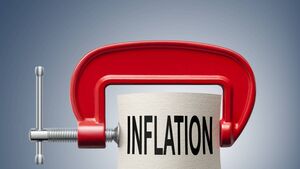'We generally just go without... times are difficult'

Grocery prices in Ireland have risen by up to 5% in the past year, according to recent research.
There has been no shortage of data this summer suggesting that the cost of living in Ireland continues its relentless rise.
The latest information from the Central Statistics Office revealed food prices rose 4.6% in the 12 months to the end of July while data from retail research consultancy Kantar suggested grocery prices were up 5% in June on the same period last year.
The factors have been debated - some have accused retailers of price gouging while farmer representative groups like the Irish Creamery Milk Suppliers' Association (ICMSA) have been clear that producing food more sustainably costs more, thus consumers should get used to paying higher prices for dairy and meat products.
But the scale and impact of rising prices on local lives will be profound, with people in East Mayo telling the they’re forced to eat less or work more.
The scale of the increase in prices has been remarkable. Christine Henry, who lives near Ballyhaunis, noticed a few weeks ago that the ground coffee she normally buys had gone up to €5.29 from €4.65.
“Bear in mind I used to get it for a long time at €3.99. It went up to €4.65 halfway through Covid and stayed at that till last month.”
That’s not all.
“The cheese I buy was €1.50 for a long time, during Covid it went up to €2.40 and this year it went up to €3.50. It’s the same weight, no difference.”
Householders in the wider Ballyhaunis area say higher prices are forcing lifestyle changes with some working longer hours to pay for higher bills while others have cut back on their consumption of products and services.
Long-time Ballyhaunis resident Megan Mylie, now living in Charlestown, explained.
“My groceries budget has doubled in the last 12 to 18 months, and I don't think it's reasonable at all.
"I used to be able to afford food for my son and I as well weekly gym fees, now just about my entire budget goes towards food and I had to cut gym out as it became a luxury I can’t afford.
“We don't eat take-aways and I try to eat as healthy as possible but I can no longer afford red meat, the price is just unjustifiable and I find myself buying more frozen goods trying to keep up with a hungry growing lad. Even bread has gotten expensive.”
Megan said she’s looking for remote online work to pay for her child’s activities.
“As a parent with no help or childcare, I'm looking for online work so that I will be able to afford to send my child to at least one sport to enrich his life as he gets bigger because as things stand now I only have money for food.”
Others, like Ballyhaunis retiree Charlotte Esterson, note that even if prices don’t rise, the size of contents of food packets have shrunk.
“Certainly we find that our grocery bills have risen and certain things like milk and coffee seem to have had unreasonable hikes.
"What annoys us most is shrinkflation, for example SuperValu double chocolate muffins. When I first bought them there were 18 in a box and they were selling for two boxes for €5. Now there are 14 in a box for the same price.
"Luckily we can cope okay, we don't have a mortgage or family.”
Also in Ballyhaunis, Sajid Chaudry said he’s seen the price of groceries rising two fold in the past half-decade.
“Yesterday. I was telling my wife that I have spent €200 since last Saturday just on groceries, which is much higher than it used to be.”
Chaudry believes supermarkets are handing out less coupons and discounts which previously cushioned price rises.
“I used to do my shopping at SuperValu and Dunnes Stores and some from Aldi. SuperValu and Dunnes Stores gave some money off vouchers, which helped people like me.”
Chaudry believes the situation is being exacerbated by the cost of housing rising at similar levels.
“Rent has been rising like a jet plane. A three-bedroom house in the Maples [estate] was on rent last week for €1,975.”
The cost of food and non-food services in Ireland is out of line with European norms, while growth in prices has outpaced wage growth. Ballindine-based Manuel Asensio said: “I can say that compared to Germany, Italy and Greece, the cost of living in Ireland is much higher. Personally, my wages in the private sector, haven’t increased at the same pace as the cost of living.”
Asensio thinks higher prices have eroded Ireland’s attractiveness for visitors.
“I appreciate that while prices of goods are much cheaper in other countries, the base salary in Ireland is way better. Having said that, accommodation in Ireland is very expensive so the remaining difference is very close between countries. So it will come to what you can do with that difference and on that point going on holidays in Ireland, for example, is unthinkable. It’s cheaper to travel abroad than staying here. Eating in restaurants or having pints in the pub is much more expensive here.”
Older people on fixed incomes are possibly most exposed to higher prices. Ballyhaunis retiree Merrilyn Finn has kept what she calls her "custard crème index" to track price rises. The cost of her favourite biscuits has gone up in price by more than 50% in the past six years.
She recounts a recent shopping trip with “pensioners whose habits are conducive to getting the best prices”, noting that the consensus was that prices of everyday goods have soared.
"The costs of meat, bread, milk increase weekly. A friend said she sees big increases in meat prices. Bread has gone up. Milk too. She is grateful for being only responsible for herself, as she can still buy what she wants. She feels for families where food is essential for growth and health. It must be very hard.”
However, Merrilyn said her friends also feel many local retailers do their best for loyal customers.
“They express gratitude to long-standing local businesses who are providing options for stretching meals. They also acknowledge how real quality is available locally.
“For me personally I love SuperValu. I can trust the discounted items for use that day and [Ballyhaunis butcher] Paddy Phillips and Maura the Wednesday fishmonger offer the best food in the world.”
A retiree living near Ballyhaunis, JT Smyth believes that prices shot up after Covid as service industries were making up for what they lost during the pandemic.
Smyth and his wife in the last year have cut back on visits to cafes and restaurants, instead taking a coffee in the supermarket where they shop.
Dearer groceries in Ireland are not a new phenomenon, said Smyth.
“In the 1980s, it was cheaper to live on a camp site in France than at home," he notes.
Higher prices are forcing a change in eating habits for others too, with several locals who spoke for this article saying they’re consuming less meat. Anna Doyle in Cloonfad explains: “We as a family always had meatless Monday for the planet but now we mainly only have meat twice a week as the cost of meat is off the scale. The price of chicken is sky high.
"The butchers used to do deals of three for €20 and now it is three for €25. It’s the same in supermarkets... my food budget had to increase... so instead of €60 a week to feed three of us it is now €80 and there will be less in the trolley for that.
“It really affects our budget. I am a careful shopper and a marketer's worst nightmare. I make a list and stick to it. I find when planning meals now I use more pantry staples than fresh food as it is so expensive. I make bulk meals out with chickpeas, mushrooms and breadcrumbs.
“My heart goes out to anyone on low income right now because there is no way they are getting full balanced meals all week... I am even struggling with that with my income.”
Rather than do with less, some like working mother Anna Kowalska from Ballyhaunis have had to work longer hours to pay for higher prices, which, she said “makes me really tired and stressed".
“If you'd want to spend time with family outside home for even a day it costs you a lot. Everything has really gone up in price and I mean really from food, clothes, travel, camps and activities for kids, hairdressers, furniture, extra medication and lastly house rent. For example, a few years ago you could rent a house for €400 or €500 and the minimum wage was €9.20 per hour; now you have to give €1,200 for rent and the minimum wage went up €4 per hour.
"Also heating, petrol and electricity prices have increased... The prices of fruit and vegetables are shocking, you try to eat healthy but for the fruit for our family I spend around €50 a week.”
The rise in prices is prompting some to change where they shop. Christine Henry, from the Granlahan side of Ballyhaunis, said: “I buy milk, yoghurt and eggs from a local farm and their quality and price is much better than the supermarkets. I don’t want to compromise on the quality of food, so I'm just buying and eating less.
“I tend to buy the same things with a little variation each week and it's got to the stage where now I'm getting half a bag of groceries for the same price a full bag would have been maybe 18 months or two years ago."
There’s not much scope to make savings on other purchases given price rises extend beyond food products, said Henry who recently bought an 11 litre tub of white masonry paint, along with a roller and a six-inch brush.
“It was nearly €90! The last time I bought same, about three years ago, the total was less than €50.”
Higher prices have created their own vicious cycle, forcing wage increases on employers who in turn have to raise their rates. Henry’s local garage this year has raised its charges.
“That's fair enough, they have no choice, but it does sting financially, and we've no option here but to have a car.”
There’s pressure too from electricity bills.
“The last bill I had for the two-month spring period was the same price as I would normally expect to pay for winter months. I've become very careful with lights, nothing on standby, I charge my phone in the car when I’m driving etc, but it doesn't seem to make much difference.”
Power costs have been the hardest to bear for a lone parent in a Ballyhaunis apartment who didn’t want to be named.
“Prices have increased, but it’s the electricity that buckles me. We generally just go without. Times are difficult for sure.”





